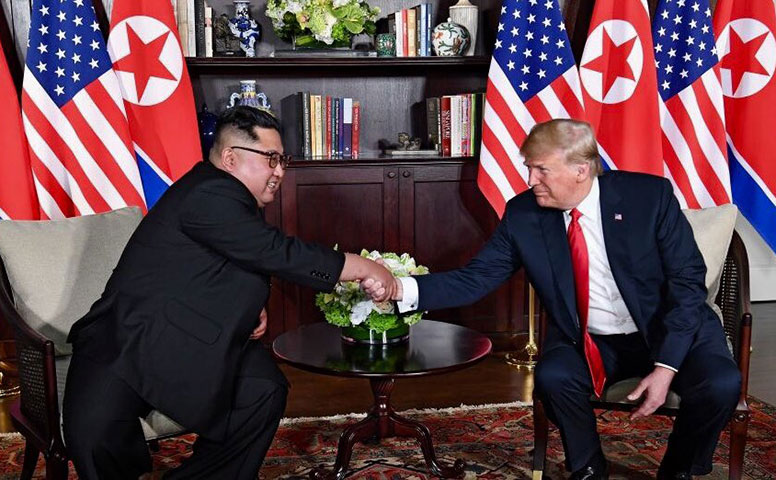14 June 2018
The Singapore Summit
And the absent giant.
By Neil Tidmarsh
 Yes, it really was the meeting of the century. Some disappointed observers are already beginning to write it off as a damp squib adding nothing new to the situation, but the two most interesting comments from the summit suggest they’re mistaken.
Yes, it really was the meeting of the century. Some disappointed observers are already beginning to write it off as a damp squib adding nothing new to the situation, but the two most interesting comments from the summit suggest they’re mistaken.
The first comment was from President Trump himself: “They have great beaches. You see that whenever they’re exploding their cannons into the ocean, right? I said, ‘Boy, look at that beach, wouldn’t that make a great condo? You could have the best hotels in the world.’”
The second comment was from China’s state-run tabloid, the Global Times: “Trump may have to abandon unrealistic ideas that the USA can become the main protagonist in North Korea’s economic story.”
Here, surely, are the seeds of a whole new conflict between two global superpowers? One of the main obstacles in resolving the conflict on the Korean peninsula has been China’s maintenance of the North as a buffer state to keep the military might of the USA away from its own borders. But with Trump now offering US economic aid, financial investment and the pleasures of Western culture to compensate Kim for ditching his nukes, it looks as if China might soon find the power of the USA stretching right up to its borders after all, not in the uniform of the US Marine Corps but of the even more powerful US dollar.
Armed conflict between the North and the South ground to a halt over sixty years ago, but armed conflict isn’t the only way of overcoming your enemy and establishing peace. Imperial Rome understood this well enough. The march of the legions wasn’t the only way of dealing with troublesome kings outside the empire; more often than not, Rome would turn them into clients (and eventually absorb their lands) by throwing money at them until they were so sunk in debt and enmeshed in Roman luxuries that they were no longer a threat. This is what happened to much of Britain. King Prasutagus of the Iceni is a case in point. The Roman generals offered to build him palaces, theatres, temples, circuses and roads – if his tribe disarmed first. Prasutagus jumped at the offer. Some of his warriors weren’t too keen on handing in their weapons, but they were soon dealt with. (Though of course it did all go horribly wrong when Prasutagus died and all debts were ruthlessly called in by a credit crunch in Rome, but that’s another story.)
China, perhaps even more that the USA, understands all this and employs much the same tactic in the modern world (see New Capital, Shaw Sheet issue 125, 19 October 2017). No wonder Beijing isn’t very happy at the prospect of Trump’s USA building hotels on North Korean beaches and sending American tourists to stay in them; no doubt China suspects and fears US economic influence spreading north along the peninsula right up to its borders as much as it fears and suspects US military influence.
The meeting between Trump and Kim wasn’t a meeting of equals. The USA is a world superpower; North Korea, although now apparently a nuclear power, is still an impoverished pariah state. Nevertheless, there are indeed two giants involved in this peace process – the USA and China. The success or failure of the USA’s overtures depends not on North Korea but on China.
After all, North Korea must be just as keen as the USA to see the process succeed. Why on earth wouldn’t Kim want to bring his ruined country in out of the cold and reap the benefits and pleasures which the twenty-first century has to offer? Ditching his nukes seems to be a small price to pay – his meeting with Trump appears to prove that they seem to have achieved their purpose. Trump turned up to the first date with a lovely bunch of flowers (the halt to military exercises in the South – not a sign of weakness or an unnecessary concession but a sensible gesture which every romantically-hopeful male should understand) and Kim not only agreed to a second date in Washington but suggested a third date in Pyongyang – so everything’s going swimmingly as far as they’re concerned.
But will China allow its anti-USA buffer to become an open and internationally-engaged state if that means it will no longer be a buffer? Will Beijing allow the promise of the US dollar to succeed where the threat of the US military failed? That remains to be seen.


